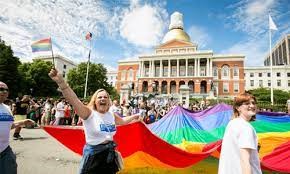Throughout history, Boston and Massachusetts have been progressive leaders in social change: the first public school, the Revolutionary War, the first public library, the Abolitionist Movement to eliminate slavery, Women’s Suffrage, Universal Health Care (almost), and Marriage Equality, to name of a few.
Yet, Boston has had, and continues to have, serious challenges. Today its economy is booming; some talk about this being Boston’s “Golden Age.” That said, Boston has one of the highest levels of income inequality of any city in the U.S. Its history of difficult race, ethnic, and class relations issues continue to this day.
In their fall course, MLD-618: Leadership, Social Change, and its Challenges: Focus on Race, Class, and Social Justice, Christopher Winship and Ira Jackson of Harvard’s Sociology Department explore a range of challenging issues facing Boston through a leadership lens. Examining cases like Boston’s school busing crisis, the Catholic church child sex abuse scandal, the Boston Harbor cleanup and Seaport development, and Boston policing, this course focuses on the analytic aspects of leadership: the careful assessment of a situation and the potential for individuals or groups to create change.
Winship and Jackson posit that social change, for better or worse, often occurs, at least in part, because of individual or group leadership. But what makes for effective, or ineffective leadership? Is it the quality or skills of an individual? Do ethics matter? A good match between what is needed and who is in leadership? Or is it making the right strategic choices based on a thorough understanding of situation?
Answering these questions requires someone to be a good social scientist – to have a sophisticated understanding of the manifest and latent dynamics of a situation and the potential leaders within it. Importantly, different situations require different types of leadership and individuals differ in their leadership skills and resources.
Through MLD-618 students have fantastic opportunity to deeply examine local issues and actually interact with the key individuals who are, or were, the protagonists in the cases being studied.
Students can ask these special class guests how they understood the situation(s) they were in, why they made the decisions that they did, and if now, in retrospect, they would have done anything differently. A few examples of expected guests in the course are:
- Ben Bradlee Jr. on the Catholic Church Child Sex Abuse Scandal
- Doug Foy on the Boston Harbor Clean Up.
- State Senator Lydia Edwards on Domestic Workers Rights: Coalitions/Partnership
- John Rosenthal, Robert DeLeo and Liz Miranda on Stopping Handgun Violence.
- Nicole Obi on Black Economic Development and Empowerment
 The core learning goal of this course is to give students the tools to rigorously analyze and evaluate situations where leadership is an issue and social change is the goal. You will learn how to do this by using a specific framework consisting of a series of steps: analyzing a situation, determining what options are available, and then evaluating each option in term of its consequences and its ethics. In addition, many cases in the course are interrelated. What is possible to do in any situation will often be constrained by what happened in previous situation(s). It is important that the cases we examine be understood in context, not as isolated situations. The local focus on Boston as a community allows students to do this. The course also provides a unique opportunity for students to learn about Boston and its environs. Through three different trips to explore Boston: one as a class (Museum of African American History), and two on your own (The Black Heritage Trail and the Ella J. Baker House) students gain concrete experience of the city in which they are studying, and see the city as a learning laboratory.
The core learning goal of this course is to give students the tools to rigorously analyze and evaluate situations where leadership is an issue and social change is the goal. You will learn how to do this by using a specific framework consisting of a series of steps: analyzing a situation, determining what options are available, and then evaluating each option in term of its consequences and its ethics. In addition, many cases in the course are interrelated. What is possible to do in any situation will often be constrained by what happened in previous situation(s). It is important that the cases we examine be understood in context, not as isolated situations. The local focus on Boston as a community allows students to do this. The course also provides a unique opportunity for students to learn about Boston and its environs. Through three different trips to explore Boston: one as a class (Museum of African American History), and two on your own (The Black Heritage Trail and the Ella J. Baker House) students gain concrete experience of the city in which they are studying, and see the city as a learning laboratory.
MLD-618 is also listed at the Faculty of Arts and Sciences as Sociology 1119. It will be taught in Fall on Mondays 3:00-5:45 in William James Hall 105. The course makes a good complement to other MLD courses in Leadership, Strategic Management, Urban and Civic Innovation, and Organizing Civic, Political, and Social Action. For questions about these courses, or any other in the MLD curriculum, email Greg Dorchak, MLD Area Administrator






